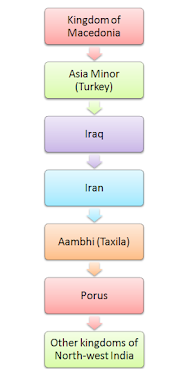Introduction of Alexander -
Alexander was the son of Philip II, the king of Macedonia. When Alexander invaded India, Northwest India was divided into many small kingdoms, in which some were Republic and some were Monarchy, which made the conquest of Northwest India easier for Alexander.
Alexander was the king of Macedonia, a kingdom in Greece. He succeeded the throne after the death of his father in 336 B.C. He established a town named ' Alexandria ' between Kabul and Sindh.
Aristotle was the teacher of Alexander. He was a well-known Greek philosopher. He was taught by Plato. He was born in Stagira, Greece. Aristotle wrote books relating to physics, spirituality, poems, drama, music, logic, politics, ethics, biology, and many more.
Alexander not only conquered 'Asia Minor' ( Turkey ) and Iraq, he also conquered Iran. After Iran, he marched towards India.
 |
Alexander's campaign on India -
Herodotus also known as the father of history and other Greece writers described India as a country with huge wealth. Alexander got inspired to invade India, after reading these descriptions.
In the 4th century B.C, Greeks and Iranians clashed and struggled in between to have their dominance on the world. At last, under the leadership of Alexander, the Greeks destroyed the kingdom of Iran. After this victory, Alexander marched towards India.
The main reason for the invasion of India by Alexander was his greed to gain wealth.
Battle of Hydaspes -
Alexander came to India through Khyber Pass and first attacked King Ambhi and the Porus of Taxila kingdom. King Ambhi and Porus of Taxila were well-known and well-reputed kings, whose kingdoms were located between Hydaspes and Chenab river.
Both kings failed in leading a united front against him neither there was any defense on Khyber Pass. King Ambhi of Taxila surrendered in front of Alexander.
On reaching the banks of the Hydaspes River (Vitasta, modern Jhelum), Alexander faced the first and most powerful resistance from king Porus. On the banks of Hydaspes, Porus and Alexander fought the famous battle of Hydaspes. In which Alexander defeated Porus.
Alexander was impressed by the bravery and courage of the Indian King, so he gave the kingdom back to Porus and made Porus his ally. After Porus, Alexander defeated many other kings and tribes in North-western India.
Victories of Alexander
Alexander Vs Magadha Empire -
Alexander had reached the banks of the Vyas River. He also wanted to advance towards the east, but his infantry refused to company him because Greek soldiers were tired of fighting and they were suffering from diseases. They were also feared by the elephant troops that they faced in fighting with Porus. They had never seen elephants fighting in a battle. Elephants were part of Indian troops from ancient times.
Greek historian Arian wrote that Indians were extremely better than other contemporaneous people in fighting.
Greek soldiers knew that there was a powerful kingdom on the banks of river Ganga. Nanda dynasty was ruling the Magadha kingdom and he has a much bigger infantry than Alexander, that's why Alexander's soldiers refused to march forward to fight a battle with the Nanda dynasty.
In a very sad tone, Alexander said I want to fill those hearts with excitement, which are suppressed by insincerity and funky poorness. In this way, a king who never got defeated by his enemies got constrained to be defeated due to his own people. He stayed in India for approx. 19 months (326-325) and always remained busy in battles in India.
Alexander Repayment -
At the time of departure, Alexander's army divided into 2 parts on reaching the estuary of the Sindhu River.
1. Waterway (Lead by Niyarkas).
2. Landroute (Lead by Craterus).
Alexander's last victory on the Indian Subcontinent was against the Patal kingdom. He divided his terrain into three parts and handed it over to three Greece Governors (Local Kings).
Alexander established 2 towns, the first one was Bucephalous, which he made in memory of his famous horse Bucephalus, who died due to the injuries he faced in the battle of Hydaspes, and the second one was Vijaynagar, which he made in memory of his victory against Porus.
Consequences of the invasion by Alexander -
The most important outcome of this invasion was the direct relations between India and Greece in various fields. Alexander's campaign opened four different waterways and land routes.
Gandhar style of art developed in India in the second century B.C is a result of Greek impact. This invasion paved the way for Greece traders and merchants and the contemporaneous conveniences of trade increased.
As a result of this invasion, some Greek colonies were established in these areas. Bucephalus on the banks of Hydaspes and Alexandria on the banks of Sindhu were more important.
Alexander's historians left geographical descriptions, in which they wrote about the campaign of Alexander with dates. This helps in preparing a date-wise history of the events that happened in India.
Alexander's historians also wrote about the social condition of India.







